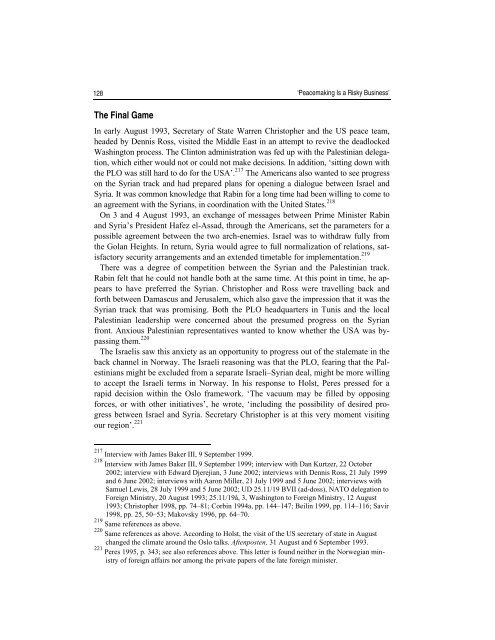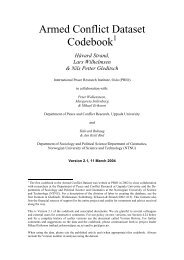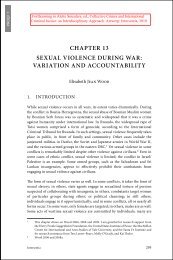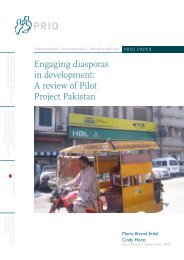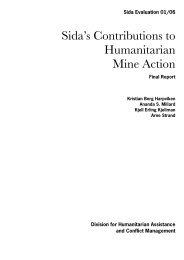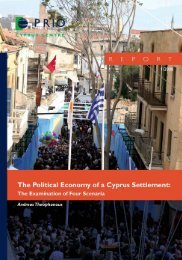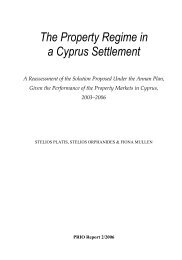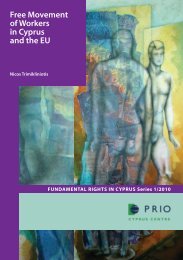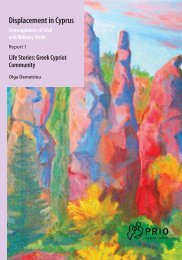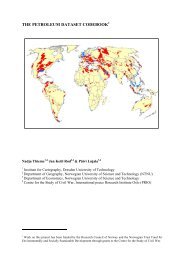Peacemaking Is a Risky Business - PRIO
Peacemaking Is a Risky Business - PRIO
Peacemaking Is a Risky Business - PRIO
You also want an ePaper? Increase the reach of your titles
YUMPU automatically turns print PDFs into web optimized ePapers that Google loves.
128 ‘<strong>Peacemaking</strong> <strong>Is</strong> a <strong>Risky</strong> <strong>Business</strong>’The Final GameIn early August 1993, Secretary of State Warren Christopher and the US peace team,headed by Dennis Ross, visited the Middle East in an attempt to revive the deadlockedWashington process. The Clinton administration was fed up with the Palestinian delegation,which either would not or could not make decisions. In addition, ‘sitting down withthe PLO was still hard to do for the USA’. 217 The Americans also wanted to see progresson the Syrian track and had prepared plans for opening a dialogue between <strong>Is</strong>rael andSyria. It was common knowledge that Rabin for a long time had been willing to come toan agreement with the Syrians, in coordination with the United States. 218On 3 and 4 August 1993, an exchange of messages between Prime Minister Rabinand Syria’s President Hafez el-Assad, through the Americans, set the parameters for apossible agreement between the two arch-enemies. <strong>Is</strong>rael was to withdraw fully fromthe Golan Heights. In return, Syria would agree to full normalization of relations, satisfactorysecurity arrangements and an extended timetable for implementation. 219There was a degree of competition between the Syrian and the Palestinian track.Rabin felt that he could not handle both at the same time. At this point in time, he appearsto have preferred the Syrian. Christopher and Ross were travelling back andforth between Damascus and Jerusalem, which also gave the impression that it was theSyrian track that was promising. Both the PLO headquarters in Tunis and the localPalestinian leadership were concerned about the presumed progress on the Syrianfront. Anxious Palestinian representatives wanted to know whether the USA was bypassingthem. 220The <strong>Is</strong>raelis saw this anxiety as an opportunity to progress out of the stalemate in theback channel in Norway. The <strong>Is</strong>raeli reasoning was that the PLO, fearing that the Palestiniansmight be excluded from a separate <strong>Is</strong>raeli–Syrian deal, might be more willingto accept the <strong>Is</strong>raeli terms in Norway. In his response to Holst, Peres pressed for arapid decision within the Oslo framework. ‘The vacuum may be filled by opposingforces, or with other initiatives’, he wrote, ‘including the possibility of desired progressbetween <strong>Is</strong>rael and Syria. Secretary Christopher is at this very moment visitingour region’. 221217 Interview with James Baker III, 9 September 1999.218 Interview with James Baker III, 9 September 1999; interview with Dan Kurtzer, 22 October2002; interview with Edward Djerejian, 3 June 2002; interviews with Dennis Ross, 21 July 1999and 6 June 2002; interviews with Aaron Miller, 21 July 1999 and 5 June 2002; interviews withSamuel Lewis, 28 July 1999 and 5 June 2002; UD 25.11/19 BVII (ad-doss), NATO delegation toForeign Ministry, 20 August 1993; 25.11/19å, 3, Washington to Foreign Ministry, 12 August1993; Christopher 1998, pp. 74–81; Corbin 1994a, pp. 144–147; Beilin 1999, pp. 114–116; Savir1998, pp. 25, 50–53; Makovsky 1996, pp. 64–70.219 Same references as above.220 Same references as above. According to Holst, the visit of the US secretary of state in Augustchanged the climate around the Oslo talks. Aftenposten, 31 August and 6 September 1993.221 Peres 1995, p. 343; see also references above. This letter is found neither in the Norwegian ministryof foreign affairs nor among the private papers of the late foreign minister.


